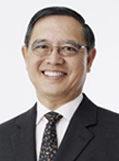
Ambassador Choo Chiau Beng is the Chief Executive Officer of Keppel Corporation and Chairman of Keppel Land, Keppel Offshore & Marine Ltd and Keppel Energy. He sits on the Board of Directors of k1 Ventures Ltd and is a Board Member of the Energy Studies Institute, a Board & Council Member of American Bureau of Shipping and the Chairman of Det Norske Veritas South East Asia Committee. He is also a member of the American Bureau of Shipping's Southeast Asia Regional Committee, Special Committee on Mobile Offshore Drilling Units and Singapore University of Technology and Design's Board of Trustee. He is presently Singapore's Non-Resident Ambassador to Brazil.
Q1. As a major corporation that has been implementing sustainability efforts across its different businesses, from environmental performance to governance, what can you advise other companies on how to make sustainability work for them"magic bullet" in sustainability. What businesses need to do is find out what is important to them and their stakeholders and do what works for them. For a diversified group like Keppel, we feel this most acutely.
Beyond that, communicating your efforts to your stakeholders is also important as it demonstrates transparency and accountability which are hallmarks of sustainable businesses.
Keppel firmly believes that while our businesses are driven by earnings, what we do must also have a positive impact on society, the community, employees and all other stakeholders. The Group has constantly strived to contribute to communities where we operate, from touching lives and protecting the environment to supporting the arts, championing safety and leading best practices in governance.
As part of our efforts, Keppel Corporation has just published it first Sustainability Report for 2010. We hope to build on this first report as a platform to engage our stakeholders so that we can improve.
Q2: Keppel has led the charge as one of the first Singapore companies to spearhead investments abroad. What are some of the lessons learned that you can share"Near Market, Near Customer" strategy, and that is why we were among the first to expand beyond Singapore to countries like the Philippines, Brazil, Vietnam, Azerbaijan and Kazakhstan.
Another important aspect is assimilation. You have to immerse yourself in the local culture, adapt and understand how things are done there. Likewise, we also take special effort to develop local talent and to inculcate them with Keppel's values.
Q3. As Singapore's representative in ASCOPE (ASEAN Council on Petroleum), what do you see are the major impediments to the realisation of the Trans-ASEAN Gas Pipeline (TAGP) project?
Q4. Latin American countries are one of the world's major energy producers as a region. As Singapore's Non-Resident Ambassador to Brazil, what kind of international impact do you feel Latin America's new energy geopolitics will have?
Q5. The ability to mine deepwater fields for new frontier energy sources outside of OPEC could help meet the challenges of rising oil prices and supply issues. As the largest rig building and marine group in the Asia-Pacific region, what do you see the future of the deepwater industry to look like in the next 10 years?
CCB:Despite the turmoil in the global markets and unrest in the Middle East and North Africa (MENA), the fundamentals of the offshore and marine industry remain intact. With rapid growth in demand for energy, conventional oil and gas fields are being depleted rapidly.
Oil companies are developing new oil and gas fields in more challenging environments and deeper water depths. The long-term outlook for global deepwater exploration remains positive.
Deepwater oil production is projected to grow about 5 to 10 million bbls/day over the next 10 years and increased rig capacity is consequently required to meet this target.
Following the Macondo oil spill, there is also a sharper bifurcation in the demand for deepwater rigs, with operators increasingly looking at newer-generation rigs. More than half of the current floater fleet are over 25 years old and newer rigs will be required for replacement and to meet increased demand. Keppel's suite of proprietary designs can address the demands for higher specifications and more capable drilling rigs to work in harsher environments.
The increase in demand for deepwater rigs is driven by Brazil, the Gulf of Mexico's Lower Tertiary Trend and West Africa. We are also starting to see an increase in deepwater activity in Asia. In the Gulf of Mexico, deepwater drilling is gradually returning with more operators receiving permits. We expect the situation to recover over the next five years.
Numerous deepwater projects in Brazil have come onstream recently. Deepwater sources now make up approximately 90 percent of Brazil's new oil and gas output. Petrobras has an extensive exploration programme and intends to order more than 60 deepwater rigs over the next decade.
Petrobras is currently tendering another 21 units that have to be built in Brazil and Keppel expects to get a fair share of these orders. Other than Petrobras, other players such as OGX are also emerging in Brazil. Keppel has already completed a floating production storage and offloading (FPSO) conversion project for OSX, an OGX subsidiary, and has secured a second such project from them.
Until recently, production in Asia has been in shallow offshore fields. But there is now a growing number of deepwater projects. Demand for deepwater drilling and production units and services remains strong, and we can expect a resurgence in orders for the deepwater drilling and production units in the future.
By: Energy Market Authority (Singapore)